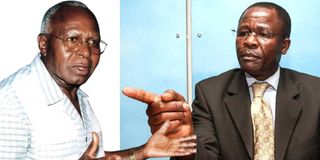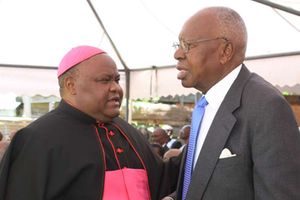
Former Cabinet Minister Simeon Nyachae (left) and journalist Peter Riang’a Makori.
On August 11, 1996, Cabinet Minister Simeon Nyachae was addressing a political meeting he had called in Kisii District, now Kisii County, to rally support for the ruling Kanu party and cement his kingpin status. At the tail end of his first term as Nyaribari Chache MP, but with decades of experience as a senior civil servant, Nyachae was certainly one of the most powerful politicians at the time.
But court papers now state that during the 1996 meeting, Nyachae showed his cards by revealing one of the few things that gave him a hard time in the political sphere – journalists whose coverage of politics and governance shone a bright light on issues that the MP would rather have had kept secret.
“The minister complained of bad publicity and wondered why his supporters had not dealt with the people who were writing bad stories about him. In addition, the said Cabinet minister had previously issued statements calling me a sycophant and irresponsible reporter, a clear indication the powerful and influential politician who was serving in the government of President Daniel arap Moi had something against me,” journalist Peter Riang’a Makori says in an affidavit before the High Court.
Nyachae’s rant incited his supporters, nicknamed amachuma (hardened metals) against Makori, who was allegedly assaulted as the MP and several police officers, and their superiors, watched. The attack could now come back to haunt taxpayers as Makori, who has in the past been awarded millions for other government-backed assault and torture incidents, seeks compensation from the State for injuries and psychological damage.
His petition points a finger at Nyachae, accusing the former MP of orchestrating the attack by using his political influence to incite supporters. Makori’s court filings paint Nyachae as a ruthless individual who went to all lengths to get revenge on the journalist for publications that the then-Cabinet minister felt painted him in bad light.
The State, however, wants the petition thrown out, insisting that Makori has raised those matters in court before and got compensation. A response sworn on February 2, 2023 by Kisii County Police Commandant Charles Kasis calls for the dismissal of the petition. He argues that Makori’s petition is res judicata (that has been deliberated in court before) and that the High Court lacks the jurisdiction to hear it.
Makori, however, argues that the issues he is raising in the petition – which are four instances of arrest, detention and beating by goons – happened between 1994 and 1996 and he had not raised them on any judicial platform before. The journalist adds that he was only confident of getting restitution following enactment of the 2010 Constitution. The State also faults Makori for filing the petition 28 years late, but Makori, in a rejoinder, says that it was only until 2017 that it was safe for him to file such a case.
Makori worked out of Kisii as a correspondent, freelancing with several news outlets, and making political enemies as his budding career took off in the Nyayo era, when anything deemed to be in opposition of President Daniel Arap Moi’s administration was risky to one’s personal safety. Walls and pillars of prison cells were a common sight for Makori, as he was arrested on trumped up charges several times, ranging from petty offences that attract small fines, to murder and robbery with violence which attracted a mandatory death sentence at the time. After being detained at Kisii and Kodiaga prisons for 11 months in 2005, Makori knew his career was incessantly calling death to come and pick him up for a death.
He sneaked into a neighbouring country a year after being released from Kodiaga prison and murder charges being dropped, then fled to the US and successfully sought political asylum. A quasi-judicial tribunal awarded Makori Sh5 million in 2006 for incidents of arrest over bogus charges and torture while in police custody that forced the journalist to seek expensive treatment in the US.
He insists, however, that the fresh case revolves around a different set of bogus arrests, unlawful detention and torture that were never raised in any other legal process. In the 1996 attack, he says after being assaulted, police still detained him in a police station overnight. “Upon being viciously assaulted, the police picked me up, took me to their Land Rover and instead of taking me to the hospital, they detained me at Keroka Police Station and released me the following day,” he adds.
To demonstrate that his plight was politically engineered, the journalist alleges that he was once arrested and charged on grounds of criminal defamation against Nyachae, Dr Hezron Manduku (then Foreign Affairs assistant minister) and Reuben Oyondi (then Planning and National Development assistant minister). He claims that prior to his arrest and arraignment, he fled to Nairobi after being tipped of an impending raid at his residence in Kisii by police. After spending time hiding, Makori alleges that he surrendered at a Nairobi chief magistrate’s court where he was granted bail pending arrest. However, after arriving in Kisii, he was arrested but when he appeared in court, one chief magistrate cancelled the bond terms set by the Nairobi court and ordered stricter terms for him, contrary to established conventions. “I was made to report to the Kisii CID office twice every day seven times a week, failure to which my bond would be cancelled,” he states. “The case dragged on for one year after which it was terminated for lack of sufficient evidence, and I was discharged.”
The petition was first filed in Nairobi in 2017 but the Attorney-General applied to have it transferred to Kisii in 2022. Mr Nyachae’s paid-up press statements responding to some of Makori’s reporting are attached as evidence by the petitioner to show that the once powerful minister had many reasons to target him. The journalist also contends his petition raises matters of constitutional nature, which could not be addressed before the promulgation of the 2010 Constitution and that there is no proper forum to raise them other than in the current court. “I could not file the petition at any earliest time other than the year 2017 for reasons that I was always on the run from those seeking to harm me,” pleads Makori. “The series of human rights violations complained of in this petition happened during the Moi regime and sustained in the early days of the Kibaki era, during which time the powerful political networks that were behind my previous persecution were still alive and active, wielding immense influence in the initial and subsequent regimes,” he adds.
Makori claims that he was arrested eight times for reasons such as covering lynchings in Bonchari Constituency, reporting on land grabbing, covering the killing of a teacher who was suspected to have had a hand in the murder of a chief and a sub-chief, political reporting, among other reasons. The case, which has not been heard since it was filed, will be mentioned at the High Court in Kisii on February 20 for fixing of a hearing date.







